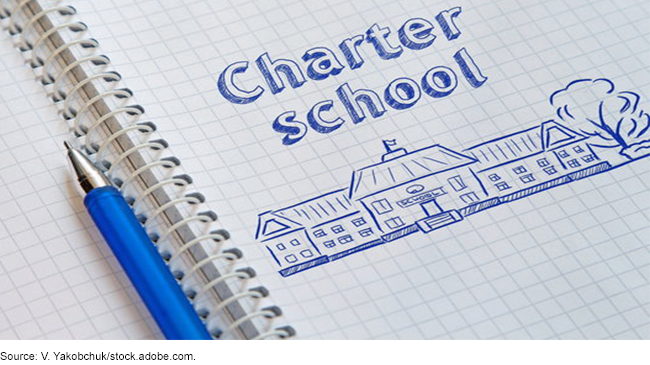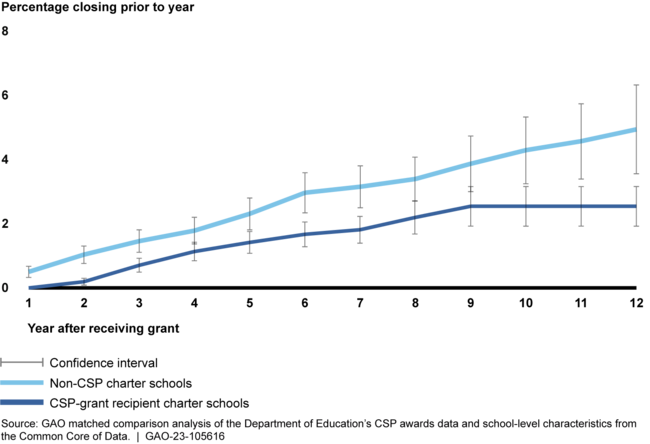K-12 Education: Charter Schools That Received Federal Funding to Open or Expand Were Generally Less Likely to Close Than Other Similar Charter Schools
Fast Facts
Charter schools are publicly-funded schools that are governed by independent organizations. From FYs 2006-2020, the Department of Education awarded over 6,000 Charter Schools Program grants ($2.5 billion in funds) to help open or expand charter schools across the nation.
We found that charter schools that received funds from these grants were 1.5 times less likely to close within 5 years. Specifically, within 5 years, 1.42% of grantees closed compared to 2.3% of schools who did not receive the grants.
We also found that states awarded about $152 million of these grants to charter schools that closed or never opened.

Highlights
What GAO Found
The Department of Education awards Charter Schools Program (CSP) grants to help open new charter schools or replicate and expand high-quality charter schools, among other things. While few charter schools closed overall, charter schools that received CSP awards closed at lower rates than similar charter schools that did not receive an award between fiscal years 2006 and 2020. GAO's analysis found, for example, that within five years after receiving CSP awards, CSP-recipient charters schools were about 1.5 times less likely to close than similar non-CSP charter schools—with an estimated 1.4 percent and 2.3 percent closing, respectively. Within 12 years of receiving CSP grants, the same pattern generally held. The pattern also generally held for CSP-recipient charter schools regardless of the schools' grade level, locale, student body racial and ethnic composition, or percentage of students receiving free or reduced-price lunch.
Probability of Charter Schools Program (CSP) Charter Schools and Non-CSP Charter Schools Closing within 12 Years of Receiving an Award

Note: GAO examined data for charter schools that received a CSP award in fiscal years 2006–2020 and matched them to similar, non-CSP charter schools. Error bars display 95 percent confidence interval for estimates.
About 14 percent of charter schools (638 schools) that received CSP State Educational Agencies/State Entities (CSP State) awards—the largest CSP grant program—closed or never opened, according to GAO's analysis of Education's CSP awards data. These 638 schools received about $152 million (8 percent) of the approximately $2 billion provided in CSP State awards during fiscal years 2006–2020.
Why GAO Did This Study
Charter schools are publicly funded, semi-autonomous schools of choice. In fiscal years 2006–2020, Education awarded 6,023 CSP grants to eligible state entities, developers, and charter management organization to help open charter schools across the nation. These grants represented about $2.5 billion in federal CSP funding. Questions have been raised about the effectiveness of CSP grants.
House Report 116-450 includes a provision for GAO to report on CSP grants, with a particular focus on charter schools that eventually closed or never opened. This report examines the extent to which CSP-recipient schools stayed open or closed compared to non-recipient charter schools in fiscal years 2006–2020 (the most recently available comparable data) and how much CSP funding went to schools that closed or never opened during this period. GAO reviewed the three Education CSP grants that are intended to create or expand charter schools: CSP State Educational Agencies/State Entities, CSP Charter Management Organizations, and CSP Non-State Educational Agencies/Developers.
GAO conducted a multivariate statistical analysis to match CSP-recipient charter schools with similar charter schools that did not receive CSP awards and compared closure rates for these two groups. GAO analyzed CSP awards data to describe funding levels for charter schools that closed or never opened. GAO reviewed relevant federal laws, regulations, and documents and interviewed federal, state, and national education organization officials. GAO incorporated technical comments from Education as appropriate.
For more information, contact Jacqueline M. Nowicki at (617) 788-0580 or nowickij@gao.gov.
